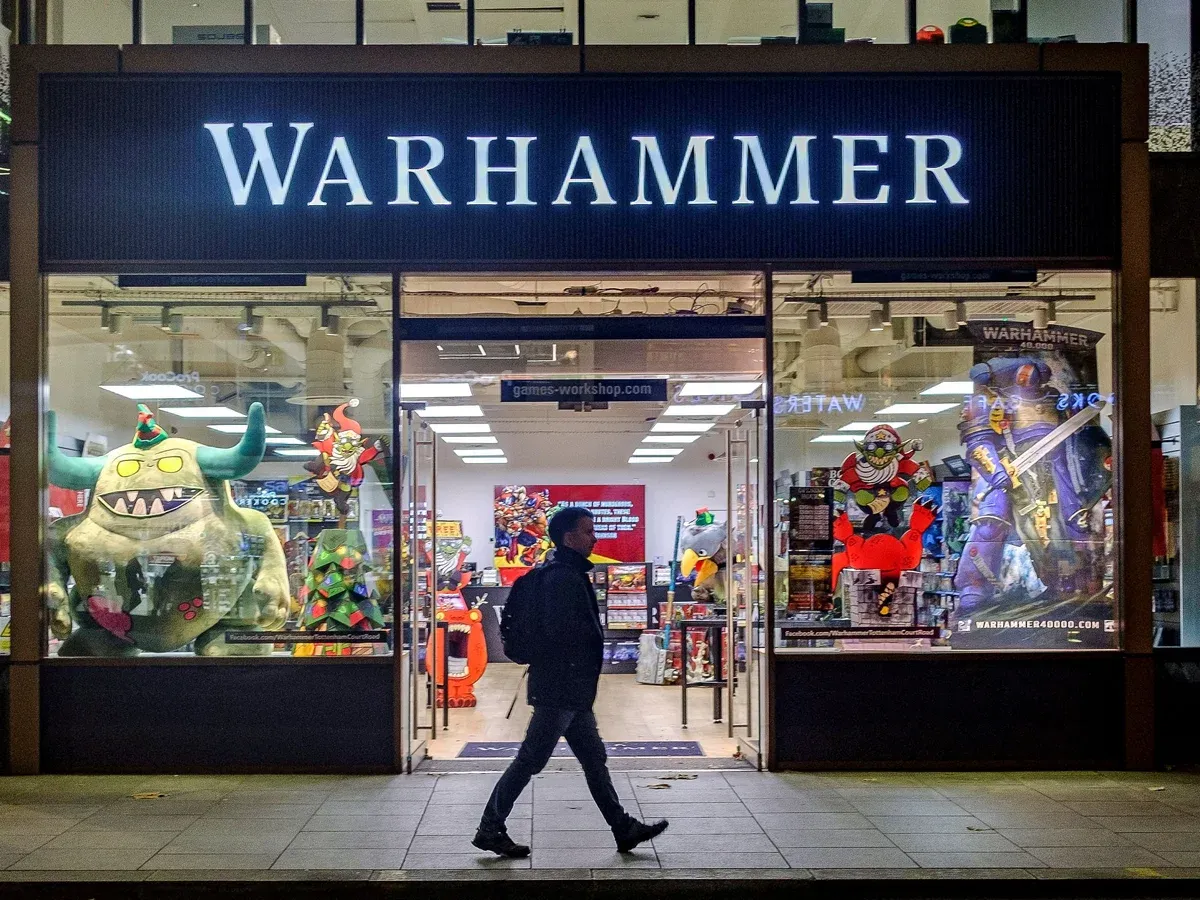When your academic presentation is maybe wrong, or Games Workshop sued someone again

My presentation at the Games Workshop Research Day last weekend was on the Chapterhouse case. Very, very briefly: Games Workshop lost (most of) a lawsuit against a small manufacturer of conversion "bits" and miniatures for units without rules. They lost because they were triggerhappy with lawsuits at the time and ended up arguing frankly weird stuff, like the particular curve of a Space Marine shoulder pad was their intellectual property and that they owned the medieval Iron Cross symbol. The case went before a US judge and he, rightly, mostly got it right after years of litigation. Chapterhouse closed anyway (GW won on enough trademark matters, most relating to trademarked terms rather than trademarked aesthetics) but it was more or less fair game for independent sculptors and miniatures manufacturers from there. Games Workshop subsequently changed a lot about how they do business: no more rules if there wasn't a miniature (and especially if there would never be one), no more official bits (already underway), consolidation of control over what they could keep hold of, and a bit of relaxation of their previously litigious stance over everything.
Outside of that, the outcome of the case basically created what we recognize as the home 3D printing market. There are a lot of independently/small studio made miniatures out there, and they're almost all done with either Warhammer or D&D in mind. Without the lawsuit, the use case for home 3D printing is home repair and medical equipment, which is a pretty thin case. I don't think I'm out on a limb saying that 3D printing looks drastically different if Games Workshop wins the Chapterhouse case outright.
My argument was that I didn't really think Games Workshop cared that much. It was intended as a provocation: Games Workshop speaks to no one outside their control, which is incredibly annoying (I called them out for this, since I think that if medical suppliers, organized crime, and car companies can give researchers access so can Games Workshop). But in a world where people can make anything, it turns out they mostly just make Warhammer miniatures. And I think that suits Games Workshop fine. What's important to them, whether they articulate it openly or not, is their capture of the entire imaginary surrounding "miniatures wargames". It's theirs, in the same way that "roleplaying games" as a category is Wizards of the Coast's.
We can and should point out that those forms are more varied and interesting than just their leading companies/brands, but for the average person it really isn't. I've been cataloging instances of TTRPGers referring to their own creations and artwork as "homebrew" for three years now in the hopes eventually finding time to write a paper on how totalizing the capture is in that corner of analog games, because it is deep if drawing a sketch of your own player character is homebrew to enough people that me periodically bouncing around the internet can nab dozens; even if it's not a big enough sample to make a declarative statement about this happening everywhere, it's big enough to be notable.
So it is with Games Workshop. If I and a friend (2) walk into our local store to play 40k with nothing but Warhammer style 3D prints, but a group of people (say 5) see it and go that's neat as hell I'm going over to the shelf to buy miniatures, Games Workshop comes out ahead. It's mostly the old timers who want to customize their miniatures, buy bits, get alternate sculpts, etc. We're a smaller part of the market than the main trunk of Warhammer players: the actual ideal Games Workshop customer, so I've heard, isn't a 48 year old man or a 14 year old boy, but a 45 year old mother.
Because of all this, and admittedly it's mostly because of WotC's data collection and move to subscriptions rather than Games Workshop's push/pull over its aesthetics, I've started to think of the platformization of analog game rules. One angle to think of this is that of a platform as mediating, shaping, and monetizing users' social interactions. And really, per Vincent Baker, if a game is "just" a conversation, then rules are mediating, shaping, and monetizing the conversation.
So Games Workshop going (mostly) quiet on the litigation front except where exact duplicates of their sculpts are involved seemed to be of a piece with this. The audience is doing its work in perpetuating, circulating, and widening the broader capture of the minis wargamer imaginary. Who gives a damn about the sculpts? To some extent, the proof is in the pudding: Games Workshop is the UK's most successful stock, it runs a legitimately cutting edge logistics company, and it's finally created the transmedia Warhammer boom it always wanted.
And then I finished my talk to go get some tea and someone showed me a link.

I don't check my phone much when I'm abroad. Too busy. So of course I was shown a news story, breaking less than 24 hours before my presentation, that Games Workshop was suing 3D studio Ghamak.
Uh oh.
But also maybe not. Before the maybe not, this is just the problem of the job. You write something after thinking about it very hard, then something happens which shakes the thing down. Nature of the beast.
But again, maybe not. The case is a little strange at my reading of the early details. Let me go through some points of difference from the Chapterhouse lawsuit:
- Games Workshop isn't accusing Ghamak of copyright or trademark infringement, per the reporting. Instead, it's citing unfair competition. On what grounds? I'm not sure. It could be cost undercutting at the production end or biting into GW's audience capture. Regardless, that distinction seems important and, I think, represents GW's real fear here: it's not the aesthetics and trademarks thereof but loosening some aspect of its brand lock-in. Those are similar but different things.
- Games Workshop doesn't care about things until it does (I've just realized sometimes I refer to GW as it and sometimes as they, whatever, you get it). Sometimes it stops caring about things that it did care about. This seems of a piece with that: Spikey Bits' reporting is that Ghamak got hit with a blanket takedown while other sculptors got hit with specific complaints. There's no rhyme or reason to it from the outside. GW is weird. Which, again, undercuts the trademark/piracy/whatever argument: if GW is defending its trademarks, it's defending its trademarks. Picking and choosing is strange, which tips me off that there are very different concerns at GW HQ than what we typically think of as intellectual property.
- The case is going before an EU court. That's telling. One of the things I pointed out in my presentation is that the US came through for once in telling GW to pound sand after Chapterhouse. The robust legal skepticism of total capture of speech is something we often but not always get right. Now, of course they have to go through Italy because Ghamak is based there and Chapterhouse was in the US, but that very fact might be way GW is going so hard here. It can probably win in a way it couldn't with Chapterhouse.
- Read maximally, and again this is per Spikey Bits, the lawsuit takes aim at any miniatures which could be compatible with Games Workshop's games. And reading that maximally means that it takes aim at any miniature. That obviously has disastrous implications and almost certainly won't manifest, but it also speaks to a company acting as if Warhammer is the totality of miniatures wargaming. Per above, it sort of is for the average person. That feels a bit like WotC trying (and failing) to role back the Open Games License a couple of years ago: ok plebes, you've had your fun but we're now a massive company at the peak of our powers, let's close the playground. A bit enshittification-y, which is of course a hallmark of mature platforms.
- The Chapterhouse lawsuit was filed when Games Workshop was at a nadir. The company had lost tons of money after the Lord of the Rings boom of the 00s and it was a real question whether it would survive another five years, much less fifteen. This is different: Games Workshop is enormously successful. It's huge. It's powerful. Going for a more diffuse but potentially more consequential lawsuit to enclose the concept of "miniatures wargame" is something 2025 Games Workshop does; going after a studio on specific points of trademark infringement is something 2010 Games Workshop did.
That's all quick and dirty but I think my basic thesis holds: Games Workshop is trying to figure out how to be a platform company but, because of its specific attachments to miniatures, it can't do it in the way WotC can with its subscription models, rules as terms of use agreement, etc. What's left is putting the harder thing (Warhammer is miniatures) first, where WotC put the easy thing first (rules as software, moving play to digital platforms).
Perhaps because this is such a weird case involved with what I think are logics most people don't think about, the public commentary is rather muted. The various forums aren't on fire with arguments, a lot of outlets aren't even reporting it, etc. I do think Spikey Bits being first out the gate on this with a strong between the lines condemnation is notable, though: SB's editorial voice is resolutely anti-piracy to an almost comical degree, with the site owner in the past seemingly in bed to some extent or other with GW corporate. If he's uncomfortable with this new case (to put it mildly) that's an indication that, just as with WotC and the OGL fiasco, GW is about to overstep.




